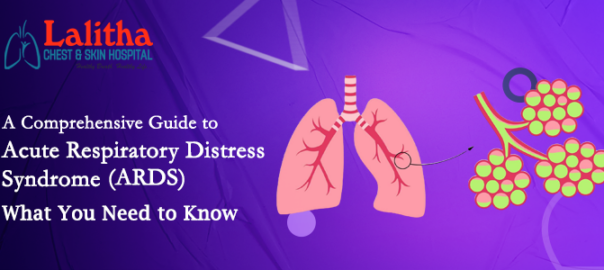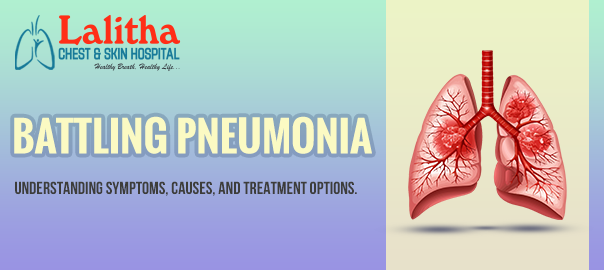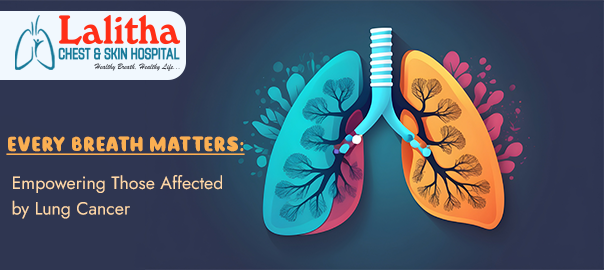Acute Respiratory Distress Syndrome (ARDS) is a severe medical condition that affects the lungs, causing difficulty in breathing and inadequate oxygen supply to the organs. Despite being a critical condition, early recognition and management can improve outcomes significantly.
What is ARDS?
ARDS is a life-threatening condition characterized by rapid-onset lung inflammation, leading to fluid accumulation in the alveoli (tiny air sacs). This fluid prevents the lungs from filling with enough air, reducing oxygen levels in the bloodstream. ARDS typically arises as a complication of underlying conditions, such as severe infections or trauma.
“ARDS is a critical condition, but early recognition and appropriate care can save lives,” says Dr. Raj Kumar Korra, MD, the best pulmonologist in Karimnagar.
With expert input from Dr. Raj Kumar Korra at Lalitha Chest and Skin Hospital, this blog delves into its causes, symptoms, diagnostic methods, treatments, and preventive measures. Read on:
What Causes ARDS?
ARDS is not a standalone disease but a result of other medical problems. Common causes include:
- Sepsis: A severe infection that spreads through the bloodstream, triggering widespread inflammation.
- Pneumonia: Bacterial, viral, or fungal lung infections can lead to ARDS.
- Trauma: Injuries like fractures, burns, or chest trauma can cause lung damage.
- Aspiration: Inhaling substances like vomit, food, or chemicals into the lungs.
- Pancreatitis: Inflammation of the pancreas can trigger systemic inflammation affecting the lungs.
- Smoke or Toxic Gas Inhalation: Exposure to harmful substances can damage lung tissues.
Symptoms of ARDS:
The symptoms of ARDS often develop rapidly and may worsen quickly. Key signs to watch for include:
- Severe shortness of breath
- Rapid, labored breathing
- Low oxygen levels (hypoxemia)
- Bluish tint to the skin, lips, or nails (cyanosis)
- Extreme fatigue
- Confusion or dizziness
How is ARDS Diagnosed?
Diagnosing ARDS involves ruling out other conditions with similar symptoms. Healthcare providers may use the following methods:
- Physical Examination: Checking for signs of labored breathing or cyanosis.
- Imaging Tests: Chest X-rays or CT scans to identify lung fluid.
- Blood Tests: Measuring oxygen levels and identifying potential infections or inflammation.
- Pulmonary Function Tests: Evaluating lung capacity and oxygen exchange efficiency.
Treatment Options for ARDS:
Treatment for ARDS focuses on addressing the underlying cause, improving oxygen levels, and preventing further lung damage. Key interventions include:
- Oxygen Therapy: In severe cases, patients often require supplemental oxygen delivered through masks, nasal prongs, or mechanical ventilation.
- Mechanical Ventilation: A ventilator may be necessary to support breathing while the lungs heal. Advanced techniques, like prone positioning, can enhance oxygen delivery.
- Medications:
Antibiotics: For infections like pneumonia or sepsis.
Anti-inflammatory Drugs: To reduce lung inflammation.
Sedatives and Pain Relievers: To ease discomfort during ventilation.
- Fluid Management: Balancing fluid intake is critical to prevent excess fluid in the lungs while maintaining blood pressure.
- Nutritional Support: Proper nutrition via feeding tubes or intravenous methods helps recover and maintain energy levels.
Prevention: How to Prevent ARDS?
Although it is not always possible to prevent ARDS, specific measures can help lower the risk:
- Vaccination: Stay updated on vaccines like influenza and pneumococcal to prevent lung infections.
- Healthy Lifestyle: Avoid smoking, maintain a balanced diet, and exercise regularly to strengthen lung health.
- Infection Control: Practice good hygiene and seek prompt treatment for infections.
- Safety Precautions: Use protective equipment in hazardous environments to avoid inhaling toxic substances.
ARDS is a serious condition requiring immediate medical attention and comprehensive care. Early diagnosis and appropriate treatment can improve outcomes and reduce long-term complications. If you or a loved one experiences symptoms of ARDS or has risk factors, consult a healthcare provider promptly.
If you’re in Karimnagar and searching online for terms like “respiratory treatment near me,” “acute respiratory depression,” “ARDS treatment near me,” or “breathing problem hospital near me,” let us save you time by helping you book an appointment quickly and easily.
Lalitha Chest and Skin Hospital, led by Dr. Raj Kumar Korra, a renowned pulmonologist in Karimnagar, is the leading chest hospital in the region, known for its exceptional success in treating Acute Respiratory Distress Syndrome and providing comprehensive care for all respiratory-related conditions. Please schedule your appointment today by visiting our website: https://lalithachestandskinhospital.com/




